
Science & Education
Scope & Guideline
Fostering impactful scholarship for a brighter educational future.
Introduction
Aims and Scopes
- Nature of Science Education:
The journal focuses on the nature of science as a crucial element in science education, examining how scientific concepts, practices, and epistemologies are represented and understood in educational contexts. - Socio-scientific Issues (SSI):
There is a strong emphasis on socio-scientific issues, exploring how these topics can be integrated into curricula to promote critical thinking and engagement with real-world problems among students. - Teacher Education and Professional Development:
The journal investigates the preparation and ongoing professional development of science teachers, emphasizing the importance of their understanding of the nature of science and effective pedagogical strategies. - Interdisciplinary Approaches:
It promotes interdisciplinary approaches in science education, encouraging the integration of history, philosophy, and sociology of science to enrich teaching and learning experiences. - Innovative Educational Practices:
The journal showcases innovative educational practices and methodologies, including inquiry-based learning, argumentation, and the use of technology in the science classroom. - Cultural and Contextual Relevance:
The journal addresses the cultural and contextual factors influencing science education, advocating for curricula that are relevant to diverse student backgrounds and experiences.
Trending and Emerging
- Environmental and Sustainability Education:
There is a growing emphasis on environmental education and sustainability, particularly in the context of preparing students to engage with global challenges such as climate change. - Integration of Technology in Education:
The integration of technology, including artificial intelligence and digital tools, in science education is increasingly prominent, reflecting the need for educators to adapt to the digital age. - Critical Perspectives on Science and Trust:
Research exploring critical perspectives on trust in science, including the impact of misinformation and public perceptions, is becoming more prevalent, particularly in light of global crises like the COVID-19 pandemic. - Culturally Relevant Pedagogy:
The journal is increasingly focusing on culturally relevant pedagogy, examining how science education can be adapted to reflect and respect diverse cultural backgrounds and perspectives. - Collaborative and Inquiry-Based Learning:
There is an upward trend in studies promoting collaborative and inquiry-based learning approaches, emphasizing active student engagement and the development of critical thinking skills.
Declining or Waning
- Traditional Science Teaching Methods:
There is a noticeable decline in publications focused on traditional, rote-based teaching methods, as the journal increasingly prioritizes innovative and student-centered pedagogies. - Purely Theoretical Studies:
The journal has shifted away from purely theoretical studies without practical implications, favoring research that directly informs teaching practices and educational outcomes. - Historical Perspectives without Application:
While historical perspectives remain important, there is a waning interest in studies that do not connect historical insights to current educational practices or challenges. - Generalized Science Literacy:
The focus on generalized science literacy is decreasing, with a shift towards more specific constructs of literacy that address critical thinking, socio-scientific issues, and contextual understanding. - Narrowly Defined Concepts in Science Education:
The journal is moving away from narrowly defined concepts in science education that do not consider broader educational contexts or interdisciplinary connections.
Similar Journals

Jurnal Penelitian dan Pembelajaran IPA
Elevating Science Teaching through Rigorous ResearchJurnal Penelitian dan Pembelajaran IPA, with ISSN 2477-1422 and E-ISSN 2477-2038, is a leading open-access journal published by the University Sultan Ageng Tirtayasa under the Faculty of Teacher Training & Education (FKIP). Launched in 2015, this journal plays a pivotal role in advancing the field of science education, providing a platform for researchers, educators, and students to share innovative research findings and pedagogical practices. Located in Serang, Banten, Indonesia, the journal aims to bridge the gap between academia and practical application in the science education sector, ensuring that knowledge is accessible to all. With its commitment to quality and transparency, Jurnal Penelitian dan Pembelajaran IPA is dedicated to contributing to the development of effective teaching strategies and enhancing research methodologies in science education, thus influencing future generations of learners.
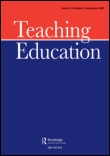
Teaching Education
Transforming learning environments with cutting-edge insights.Teaching Education, published by Routledge Journals, Taylor & Francis Ltd, is a pivotal journal in the field of educational studies, with an ISSN of 1047-6210 and an E-ISSN of 1470-1286. Established in the United Kingdom, this journal has significantly contributed to the discourse on educational theory and practice since its inception in 1987, with a focus on research that enhances teaching methodologies and promotes effective learning environments. With a commendable Scopus rank of 419 out of 1543 in the Social Sciences - Education category, placing it in the 72nd percentile, it attracts a diverse range of scholarly contributions that elevate the quality of education worldwide. Although it does not offer open access, Teaching Education remains an essential resource for researchers, educators, and policy makers interested in the latest developments and insights in educational practices, making it a valuable addition to any academic library.
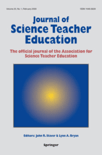
Journal of Science Teacher Education
Transforming Science Teaching Through Research.Journal of Science Teacher Education is a premier academic journal dedicated to the advancement of education in the field of science teaching. Published by ROUTLEDGE JOURNALS, TAYLOR & FRANCIS LTD in the United Kingdom, this journal has established itself as a vital resource for researchers, educators, and policymakers, reflected in its commendable impact factor and Q1 ranking in Education for 2023. Covering a broad spectrum of topics related to science education, the journal aims to foster innovation and improvement in teaching practices, curriculum development, and educational policy. With an HIndex indicating its citation impact and Scopus rank placing it in the top quartile of educational journals, Journal of Science Teacher Education provides rigorous peer-reviewed research that drives effective pedagogical strategies and enhances science literacy. Recognizing the importance of continuous professional development in science education, the journal serves as a platform for sharing empirical research, theoretical frameworks, and case studies that inform and inspire educators worldwide.

Revista Educacao e Linguagens
Elevating research in education and linguistic studies.Revista Educacao e Linguagens is a distinguished peer-reviewed journal dedicated to the exploration and advancement of educational practices and linguistic studies. Published by UNIV ESTADUAL PARANA's Escola de Música e Belas Artes do Paraná, this journal aims to foster dialogue and research dissemination in the fields of education and languages, providing a vital platform for scholars and practitioners alike. With a commitment to quality and relevance, the Revista Educacao e Linguagens encourages submissions that address pressing issues in language education, pedagogical strategies, and interdisciplinary perspectives. While the journal is not currently listed as Open Access, it remains a valuable resource for professionals looking to enhance their theoretical and practical understanding of educational and linguistic phenomena. Through its rigorous editorial process, the journal seeks to maintain high standards of research integrity and scholarly impact, making it an essential read for researchers, educators, and students devoted to improving educational outcomes.
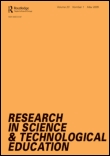
Research in Science & Technological Education
Empowering Educators with Cutting-Edge InsightsResearch in Science & Technological Education, published by Routledge Journals, Taylor & Francis Ltd, is a leading international journal dedicated to advancing the field of education within the realms of science and technology. With its ISSN 0263-5143 and E-ISSN 1470-1138, this prestigious journal provides a platform for innovative and rigorous research from 1983 to the present, thus offering critical insights into pedagogical practices, curriculum development, and policy-making. Boasting a remarkable impact, it ranks in the top quartile (Q1) in both Education and Multidisciplinary categories as of 2023, with an impressive Scopus ranking of #270 out of 1543 in Social Sciences _ Education, placing it in the 82nd percentile. Researchers, educators, and students will find invaluable resources and discussions that shape the future of science and technological education in an increasingly complex world. Although this journal does not offer Open Access, it maintains a strong commitment to disseminating high-quality research, making it an essential read for those invested in the evolution of educational practices and outcomes in the STEM fields.

Journal of Baltic Science Education
Fostering Innovation in Educational PracticesThe Journal of Baltic Science Education, with ISSN 1648-3898, is a leading academic journal published by the SCI METHODICAL CENTRE - SCI EDUCOLOGICA in Lithuania. This esteemed journal, established in 2008, has gained recognition within the educational sector, boasting a notable impact factor that places it in the Q2 category for the year 2023, highlighting its significance in advancing educational research. With Scopus rankings reflecting a commendable placement at #659 out of 1543 in the Education category, the journal serves as a vital platform for disseminating knowledge and fostering discourse among researchers, professionals, and students in the field of science education across the Baltic region and beyond. The journal’s objectives include promoting innovative educational practices, sharing empirical research findings, and contributing to the development of effective science teaching methodologies, ensuring that it remains at the forefront of academic inquiry in education.

International Journal of Education in Mathematics Science and Technology
Exploring new horizons in mathematics, science, and technology education.The International Journal of Education in Mathematics Science and Technology (ISSN: 2147-611X, E-ISSN: 2147-611X) is an esteemed publication dedicated to advancing knowledge and research in the fields of mathematics, science, and technology education. Published by Necmettin Erbakan University in Turkey, this journal serves as a vital platform for educators, researchers, and professionals to disseminate innovative methodologies, pedagogical strategies, and educational technologies. With a commendable Q2 ranking in both the Education and Mathematics categories for the year 2022, it clearly exemplifies its impact in these domains, boasting a Scopus rank of #19 out of 74 in Mathematics (miscellaneous) and a position in the 75th percentile. Although the journal has transitioned into open access, it remains committed to fostering a rich dialogue among scholars and practitioners dedicated to enhancing educational outcomes in mathematics and science. Researchers and educators interested in contributing to pedagogical advancements are encouraged to submit their work, thereby playing a part in influencing the future of education.
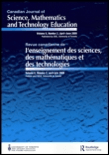
Canadian Journal of Science Mathematics and Technology Education
Elevating Educational Practices in STEM DisciplinesCanadian Journal of Science Mathematics and Technology Education (ISSN: 1492-6156; E-ISSN: 1942-4051) is a prominent publication by SPRINGER based in Switzerland, dedicated to exploring innovative methodologies and practices in the fields of science, mathematics, and technology education. Established in 2001 and continuing to 2024, the journal maintains a strong reputation within the academic community, reflected in its Q2 ranking in the Education category for 2023 and a commendable Scopus ranking that places it in the top 25% of journals within the social sciences education domain (Rank #383/1543). This journal serves as a critical platform for researchers, educators, and practitioners interested in the latest developments, research findings, and discussions pertaining to instructional strategies and curricular advancements. Although it is not open access, the journal's insights and contributions are invaluable for those aiming to elevate educational practices and address contemporary challenges in STEM education.

International Journal of Instruction
Exploring the forefront of teaching and learning methodologies.International Journal of Instruction is a distinguished peer-reviewed journal dedicated to advancing the field of education through high-quality research and innovative instructional practices. Published by GATE Association for Teaching & Education in Switzerland, this open-access journal has been a beacon of knowledge since its inception in 2008, ensuring that impactful educational research is freely accessible to scholars, educators, and practitioners worldwide. With an impressive Q2 ranking in Education and a notable position in the 80th percentile within its category in Scopus, the journal showcases cutting-edge studies and discussions that reflect current trends and methodologies in teaching and learning. The scope of the journal includes a wide array of topics, ranging from instructional strategies to curriculum development, making it a vital resource for anyone engaged in the dynamic landscape of education. Explore the International Journal of Instruction today to contribute to and benefit from the collective wisdom of the global educational community.
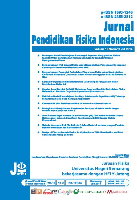
Jurnal Pendidikan Fisika Indonesia-Indonesian Journal of Physics Education
Exploring New Frontiers in Physics PedagogyJurnal Pendidikan Fisika Indonesia-Indonesian Journal of Physics Education is a premier open-access journal dedicated to advancing research and pedagogy in the field of physics education. Published by Universitas Negeri Semarang, this journal aims to provide a platform for educators, researchers, and professionals to disseminate innovative teaching practices, empirical studies, and theoretical insights that contribute to the enhancement of physics education globally. With a commitment to accessibility since its inception in 2009, the journal is instrumental in fostering collaboration and knowledge sharing across the international physics education community. The journal not only serves as a vital resource for scholars and practitioners but also plays a significant role in shaping the future of physics teaching and learning in Indonesia and beyond. Researchers and educators are encouraged to submit their manuscripts to engage with the latest trends and research in this dynamic field.